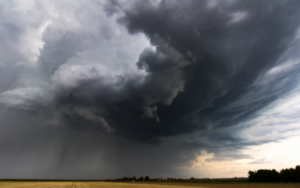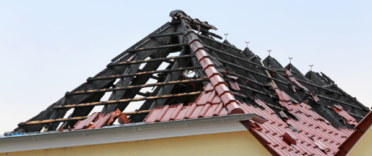
The Met Office has logged a number of storms in the UK since the start of 2024 with wind speeds reaching in excess of 100mph together with significant flooding. Many people have experienced damage to their homes as a result of the storms and so you may be wondering whether your home insurance policy covers storm damage. In this article, we look at how a storm is classified and whether you can claim on your insurance for storm damage.
What is classified as a storm?
A storm is often classified differently by different insurers and you would need to check your policy documents carefully to see what your own policy covers. Some insurers use the Beaufort wind force scale which categorises wind speeds on a scale of 0-12. On this scale, minimum wind speeds of 48 knots (55mph) are considered a storm.
In its policy documents, Admiral home insurance classifies a storm as "Wind with gusts of at least 55mph, heavy rainfall at a rate of at least 25mm per hour, snow to a depth of at least 30cm in 24 hours, or hail that causes damage to hard surfaces or breaks glass."
Is storm damage covered on my insurance?
Can I claim for storm damage on my house insurance?
Most home or buildings insurance policies cover storm and flood damage but exactly what is covered varies depending on the provider. In most cases, you may be able to claim for damage to the building as long as you can prove that it was caused by the storm and not due to general wear and tear or poor upkeep.
It is worth checking your policy documents carefully as most insurers will not cover damage to gates or fences or damage caused to garden plants or furniture.
Some insurers may require a specialist to attend your property to get clarification on whether the damage could have been caused by a storm. If you have a contents insurance policy you may also be able to claim for damage caused to items inside your property e.g due to flooding. The comparison website MoneySuperMarket says that 10.23% of home insurance claims between June and August 2024 were for storm damage. Check out our article "What is home insurance" for a more detailed look at home and contents insurance, including what it covers.
In the following comparison table we highlight the storm cover for two well-known home insurance providers.
Storm cover comparison
| Admiral | Aviva | |
| Cover for storms and flooding | Yes | Yes |
| Storm wind classification | Winds with gusts of at least 55mph | Winds with gusts of at least 55mph (property location is also considered) |
| Cover for gates or fences | No | No |
Can I claim for storm damage on my car insurance?
Fully comprehensive car insurance policies are likely to offer cover if your car is damaged by a storm but you may need to check your policy documents carefully for any listed exclusions. For example, your car may not be insured against flood damage if your insurer deems that you did not take reasonable precautions to avoid the damage e.g driving through floodwater. If your car was damaged by a flood and it was unavoidable e.g. your car was parked in its usual spot at home, then you may be covered.
What to do if your house has been affected by a storm
If your property has been affected by a storm and is damaged then you will need to contact your insurer immediately. You may be asked to provide proof that your property was not previously damaged prior to the storm and you may be required to provide photographs of the damage. If you require emergency repairs the insurer may be able to arrange this for you but if you have already had the work carried out, ensure you keep any receipts in the event of a claim.
When making a claim on your home insurance policy it is likely you will need to pay an excess which will have been agreed upon when you took out the policy. Making a claim on your insurance policy could also mean that your home insurance policy goes up when it comes to renewal.
How to prevent storm damage to your property
In order to try to minimise any damage to your property in the event of a storm in the future you can try the following:
- Check and secure any loose fence panels and roof tiles
- Ensure all doors and windows are secure
- Check for blockages in guttering
- If possible, park your car away from trees



